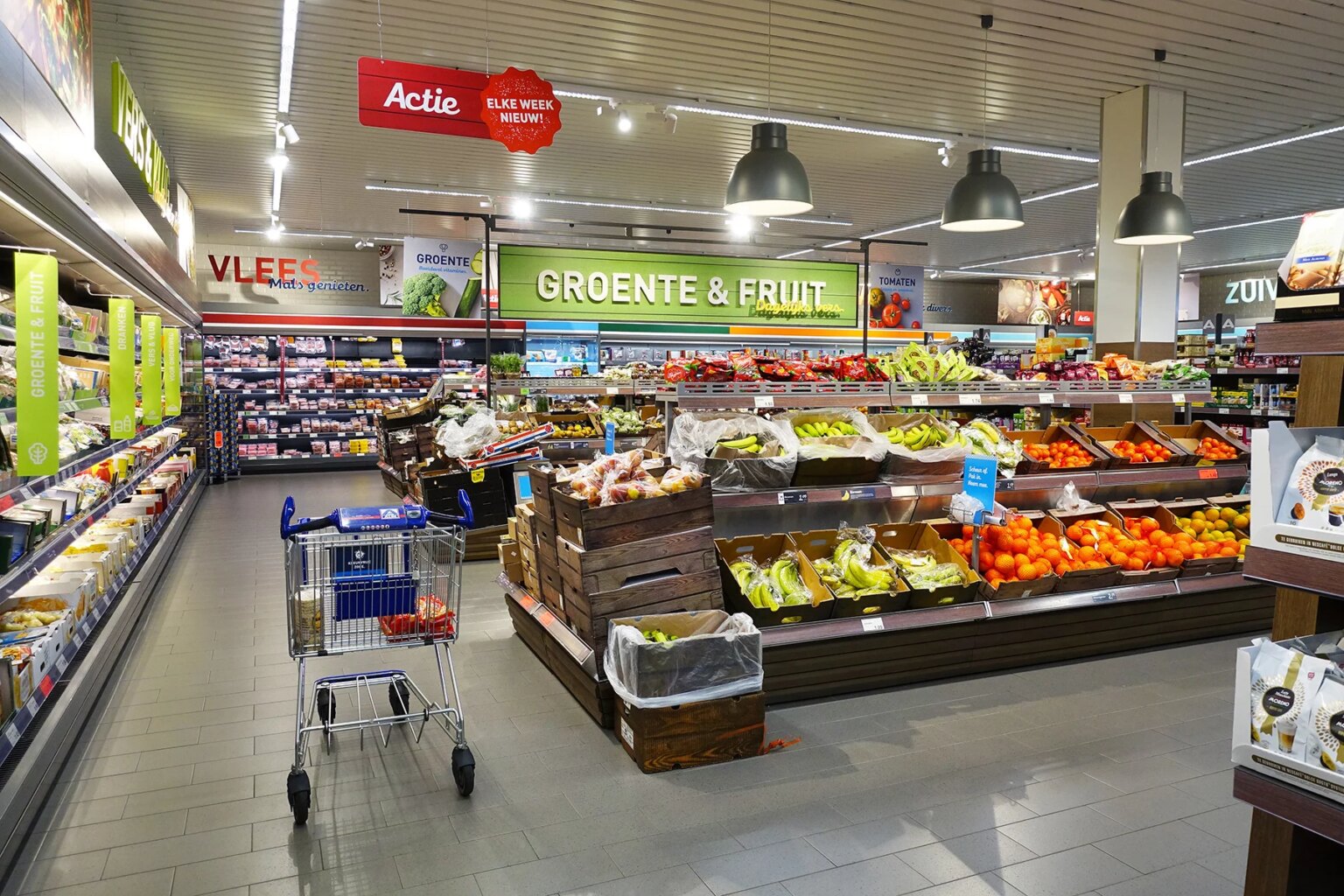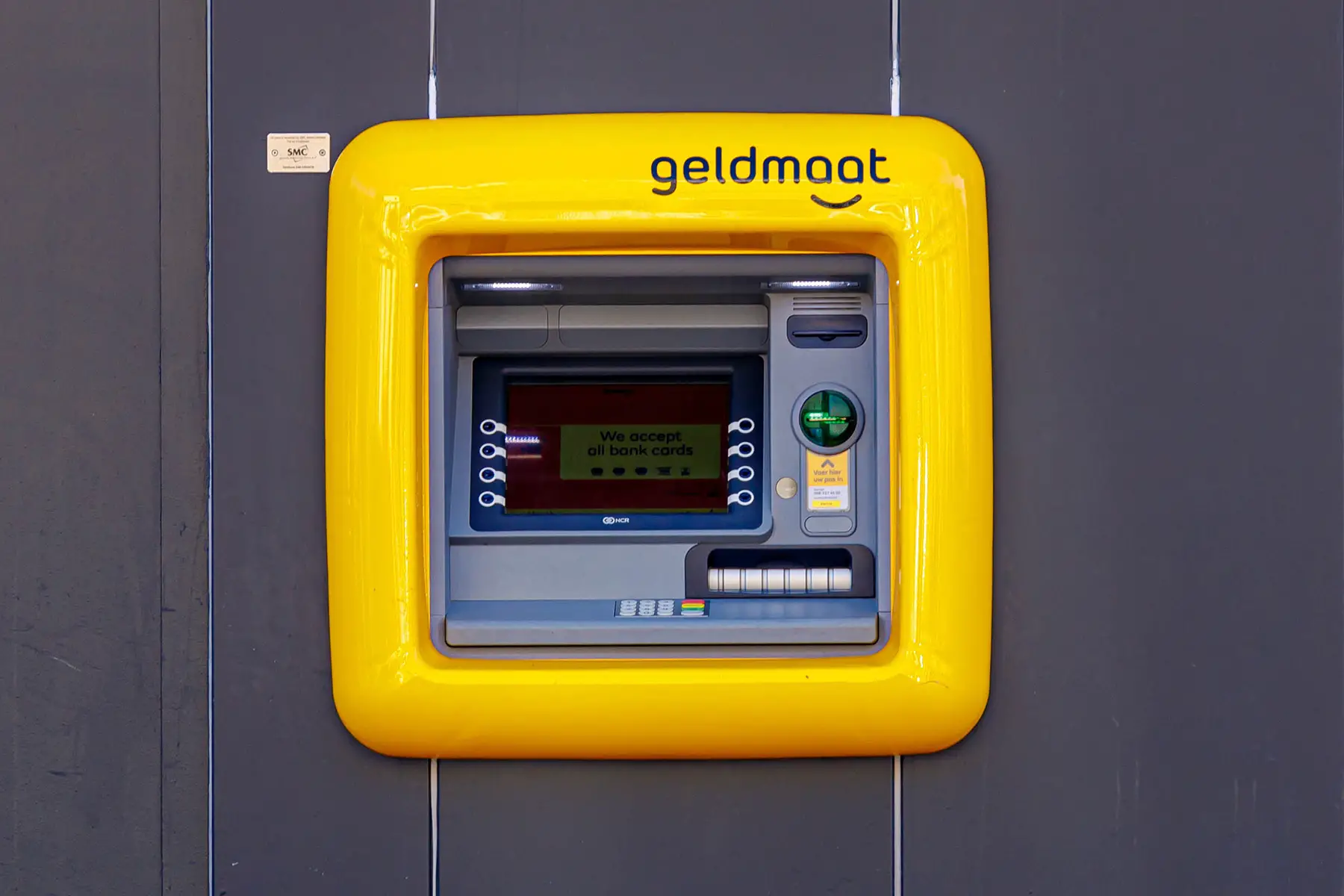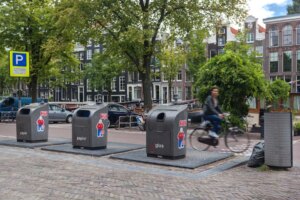Exploring new grocery stores is undoubtedly one of the underrated highlights of expat life. There are aisles and aisles of new foods to taste, buy, and fall in love with as you adapt to your new life. It’s safe to say it definitely feels a lot less of a chore than it was back home.
If you’re moving to the Netherlands, you’ll be pleased to know that Dutch supermarkets don’t disappoint. With plenty of fresh produce, international foods, and convenient locations, Dutch supermarkets will keep you and your family going back for more.
To help you get more from your food shopping in the Netherlands, here’s our guide to everything you need to know about Dutch supermarkets and grocery stores. This includes information on the following:
- Grocery shopping in the Netherlands
- Supermarkets in the Netherlands
- Things you need to know about supermarkets in the Netherlands
- Grocery delivery services in the Netherlands
- Ethnic grocery stores in the Netherlands
- Food shopping at Dutch markets
- Specialty stores in the Netherlands
- Convenience stores in the Netherlands
- Liquor stores in the Netherlands
- Buying groceries from your home country
Flink
Empty cupboards but no time to go shopping? Flink offers all your favorite supermarket products at supermarket prices, delivered directly to your door. Whatever you need – food items, toiletries, or stationery, get it delivered in minutes with Flink.
Grocery shopping in the Netherlands
The local supermarket is probably one of the first places you visit when you first move to the Netherlands. When you step through the doors that very first time, you’ll quickly realize that Dutch supermarkets might not be the same as they are back home. But don’t let that stop you from going wild in the aisles.
Don’t like supermarket shopping? There are plenty of other options for your groceries. These include local fresh food markets, online food shopping delivered straight to your door, and specialty shops. If you don’t fancy cooking at all, you’ll find a range of restaurants, cafes and snack bars in all major Dutch towns and cities.
Supermarkets in the Netherlands
The first thing you’ll probably notice about Dutch supermarkets is their size, especially if you’re arriving from North America or Australia. Dutch supermarkets in major cities tend to be compact, but you’ll soon be surprised at just how much they can cram onto their shelves.
Due to this, you may not be able to get hold of everything you’re looking for. However, the product range in supermarkets tends to vary so what you can’t find in one you may find in another, just around the corner. In bigger supermarkets in more suburban or out-of-town locations, you should be able to find everything you need.
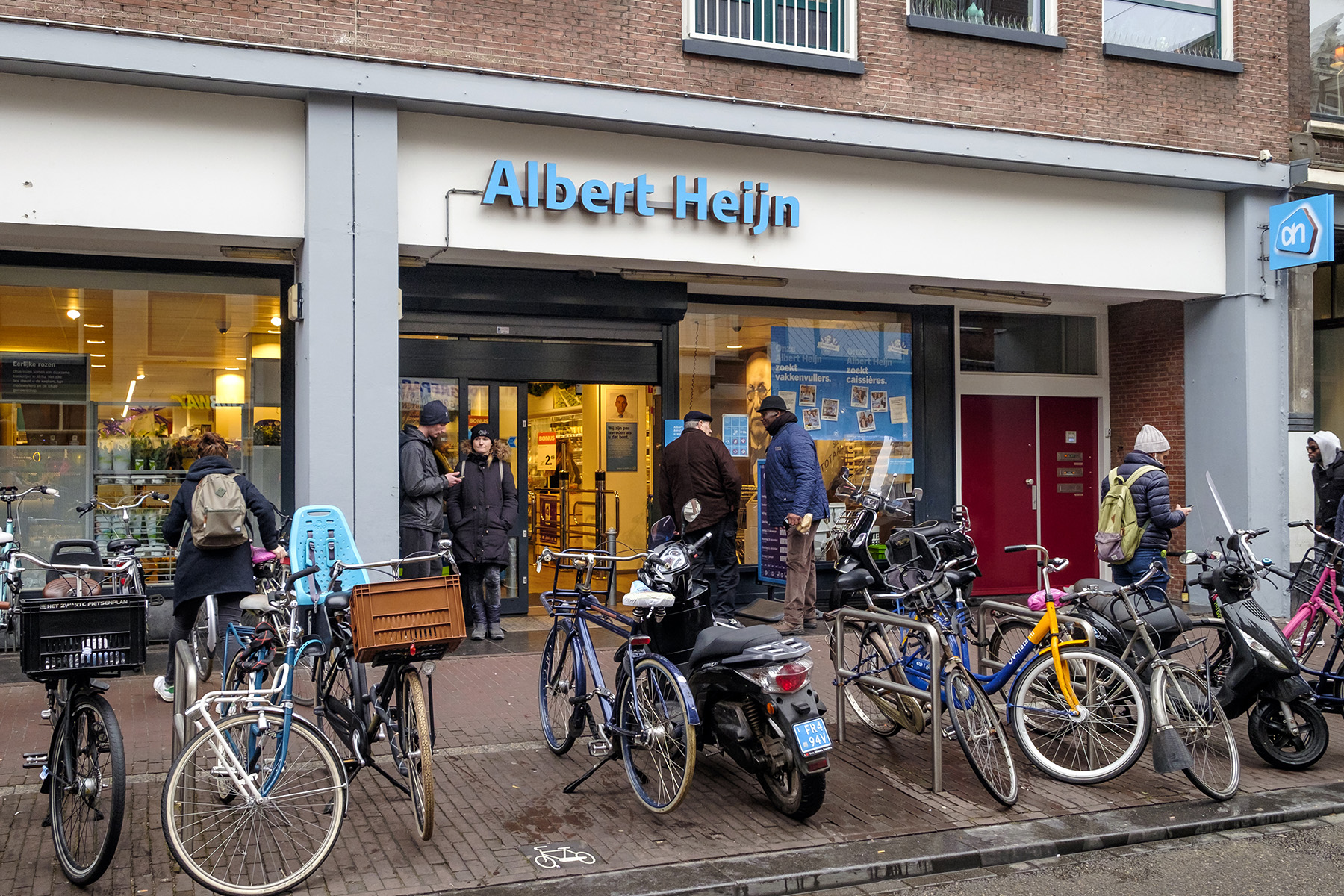
Supermarkets may seem more expensive than you’re used to, particularly for products like fresh meat and produce. However, the stores are generally well-stocked with good quality fresh meat and produce, dried groceries, and impressive dairy sections. Most also have in-store bakeries. You’ll also find plenty of in-store offers and discounts you can take advantage of to make your money go further.
Dutch supermarket chains
For a relatively small country, the Netherlands has plenty of supermarket chains to choose from. You’ll likely find you have one or two to choose from in your neighborhood. These can sometimes even be opposite to each other. Some of the main chains you’ll find in Dutch neighborhoods include:
- Albert Heijn: The premium retailer is the largest Dutch chain with almost 1,000 stores and a product range focusing on quality. Pick up an AH Bonus card for discounts. Larger, hypermarket-type stores – called AH XL – can be found in suburban areas.
- Jumbo: Albert Heijn’s biggest competitor is slightly easier on the wallet. Generally found in more residential neighborhoods, Jumbo stores stock a decent selection of fresh and dried goods.
- Plus: The third-largest supermarket chain in the Netherlands is a co-operative with over 200 stores. Largely found in the south of the country, particularly South-Holland and North-Brabant.
- Coop: The aptly named Coop also started life as a cooperative. There are over 200 Coop stores in the Netherlands, mostly in residential neighborhoods. Hypermarket-style Supercoop stores are also available.
- Dirk: Previously known as Dirk van den Broek, these well-stocked supermarkets rank among the cheapest Dutch supermarkets. Easy to spot, the storefronts are decorated with bright red Dirk flags.
You’ll likely come across other supermarket chains in the Netherlands. These often change depending on your region and include Vomar, Deen, Dekamarkt, and Hoogvliet.
Discount supermarket chains in the Netherlands
You’ll also find a number of discount supermarkets on Dutch streets. Many locals shop at both discount and high-end stores, ensuring their groceries are a mix of cheaper essentials and premium extras. Discount retailers in the Netherlands include the following:
- Lidl: The German discount retailer is one of the biggest supermarket chains in the Netherlands. Most of their no-frills supermarkets also offer discounted non-food products and many also have in-store bakeries.
- Aldi: Another German import, Aldi offers a range of basic food and household products. Like Lidl, Aldi stores are generally found in residential neighborhoods.
Dutch specialty, health, and organic supermarkets
If you’re looking for something a little more niche when it comes to your grocery shopping, the Netherlands also has a range of specialty supermarkets. These offer more premium product ranges, including vegan, organic, and gluten-free lines, amongst others. Some of the more high-profile specialty supermarkets include the following:
- marqt: Amsterdam-based marqt is an expat favorite. Expect to pay a little more for their ethical product line, which includes a great selection of vegan options. Stores can also be found in Rotterdam, Haarlem, and The Hague.
- Ekoplaza: The largest chain of ethical supermarkets in the Netherlands, Ekoplaza boats an organic product line. There are over 70 locations nationwide, and the company is moving towards a plastic-free shopping experience.
Supermarket opening times
Generally speaking, Dutch supermarkets have fairly standardized hours. Most will open early in the morning (07:00 or 08:00) and close late in the evening (often at 22:00). Outside of these hours, you may still be able to find essentials at your local convenience store as some are open twenty-four hours.
Some supermarkets, particularly in more rural areas, may have different opening hours. This might include earlier closing times and different operating hours on Sundays. For more information, check the website listings of your local store.
Things you need to know about supermarkets in the Netherlands
As an expat, there are certain things you need to know before filling up that Dutch shopping cart. Here are some of the things you should know:
- There are no shopping bags: Dutch people bring their own shopping bags from home. You should be able to buy bags at the checkout for a small fee – usually less than €0.50.
- You might not be able to pay with credit card: Yes, you read that right. Some supermarkets – including most Albert Heijn stores – don’t accept Visa or Mastercard credit cards. You’ll need cash or a Dutch bank account, which will provide you with a Maestro or V-Pay card that can be used everywhere.
- You can’t buy liquor: You can buy wine and beer at Dutch supermarkets but for spirits, you’ll need to go to a liquor store. These are often located nearby. Some supermarkets even have separate liquor stores inside.
- The prices might be rounded up: The Netherlands has phased out the €0.01 and €0.02 coins, meaning prices are either rounded up or down at the register, often to the benefit of the store.
- Bottle returns: When you buy certain drinks, you pay a small refundable deposit for the bottle that’s included in the price. Most supermarkets have bottle returns that let you collect this deposit.
- Bag it up: Don’t expect any help packing your groceries at Dutch cash registers. You have to bag your own groceries in the Netherlands, and it pays to do it quickly.
- Get on your bike: Many Dutch supermarkets don’t have car parks – particularly in towns and cities – so most locals walk or cycle. You have to carry what you buy or equip your bike with panniers.
Grocery delivery services in the Netherlands
If you are unable to get to the supermarket in person or prefer the convenience of home delivery, you’re in luck. Many local supermarkets offer home delivery services, including Albert Heijn and Jumbo. There are also a growing number of online-only supermarkets and grocery stores, such as:
Simply shop online and choose your delivery slot. You may need to pay for the groceries on delivery, though, so ensure you have your payment card ready.
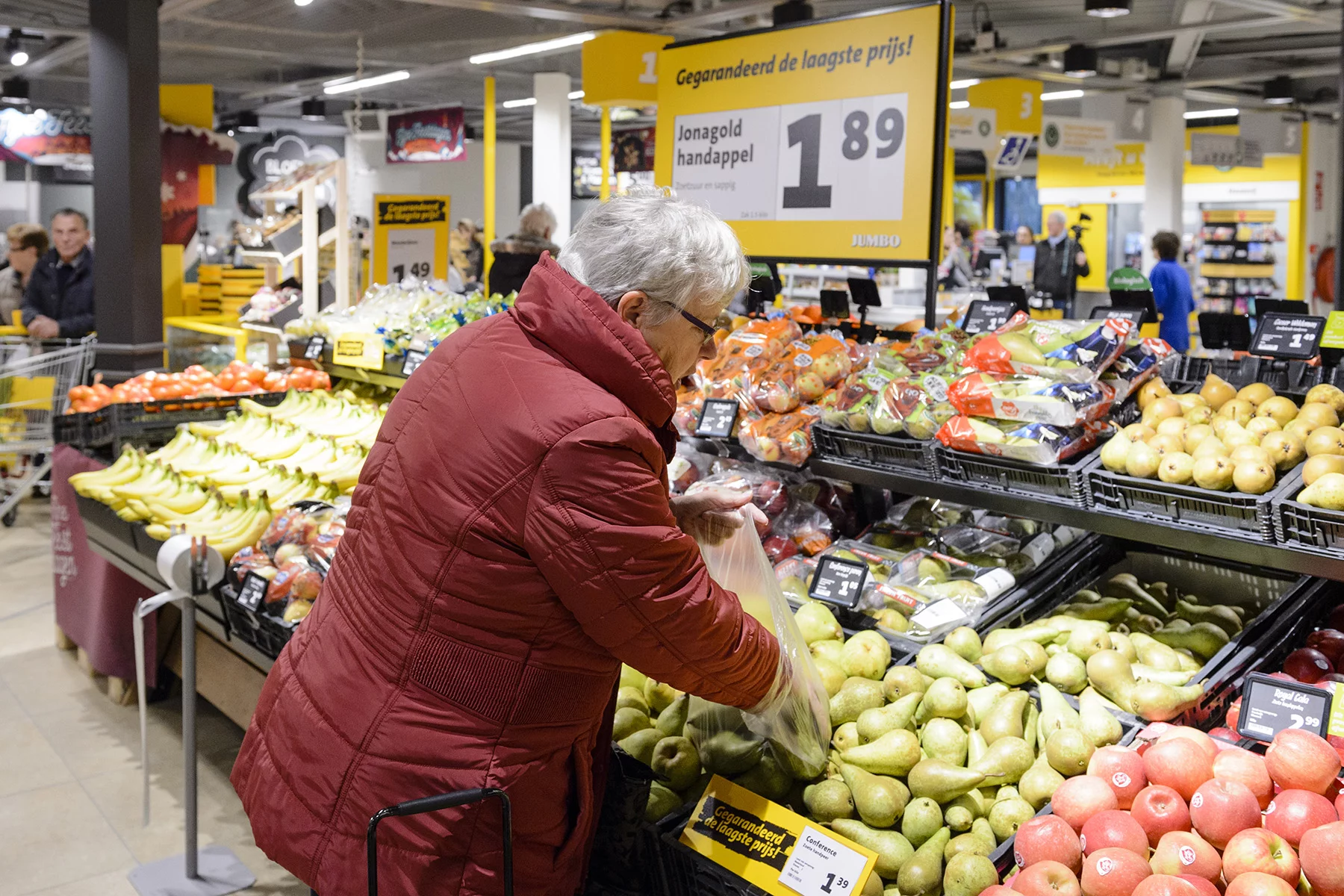
There are a number of other delivery options in the Netherlands, including meal-kit providers. These companies deliver pre-prepared meal kits (maaltijdbox) to your front door, filled with seasonally fresh ingredients and recipes to create your own meals at home. Dutch meal-kit providers include:
If you don’t fancy the sound of cooking, the Dutch have you covered. From cozy brown cafes and street eats to Michelin-starred restaurants, you’ll find eating options for all tastes throughout the country. If you’re staying in, why not get a takeout? Delivery platforms operating in the Netherlands include:
These platforms will connect you with your favorite neighborhood takeaways and restaurants. Whether you’re feasting with the family or eating with friends, all you have to do is sit back and wait for your delivery to arrive.
Ethnic grocery stores in the Netherlands
Another option for Dutch grocery shopping is ethnic supermarkets. There are plenty of these stores across the Netherlands, particularly in larger towns and cities where there are more ethnically diverse populations. Many are Turkish supermarkets, but Moroccan, Chinese, Indonesian, and Japanese grocery stores can also be found in larger cities.
These shops are often popular with expats as they tend to stock a greater variety of international foods. This is especially the case when it comes to herbs and spices that are often not available in Dutch supermarket chains. These products are generally cheaper in ethnic grocery stores, although you may find a cheaper and more varied selection of everyday items at chain supermarkets.
Food shopping at Dutch markets
Get some fresh air while you shop for groceries at your local market. Generally speaking, markets in the Netherlands offer fresh, good quality produce, although their range can be limited. Most markets will have stalls selling fresh fish, eggs, cheese, fruit and vegetables, and dried goods like nuts and other snacks.
Markets will sometimes work out cheaper than supermarkets and specialty stores. They can also be a great way to get hold of more niche products, such as certain cheeses and nuts. However, the availability of certain products is not always guaranteed and markets can get very busy, particularly in more touristic areas.
Specialty stores in the Netherlands
If supermarkets are a little too impersonal for you, why not head to your local specialty shops instead? These will likely be more expensive than the supermarket or market stalls, but the quality and choice can often be greater.
Bakeries in the Netherlands may not be as common as in France or Spain, but most neighborhoods will have at least one. You’ll also be able to find butchers in many local shopping areas, although you may want to brush up on the Dutch terms before visiting.
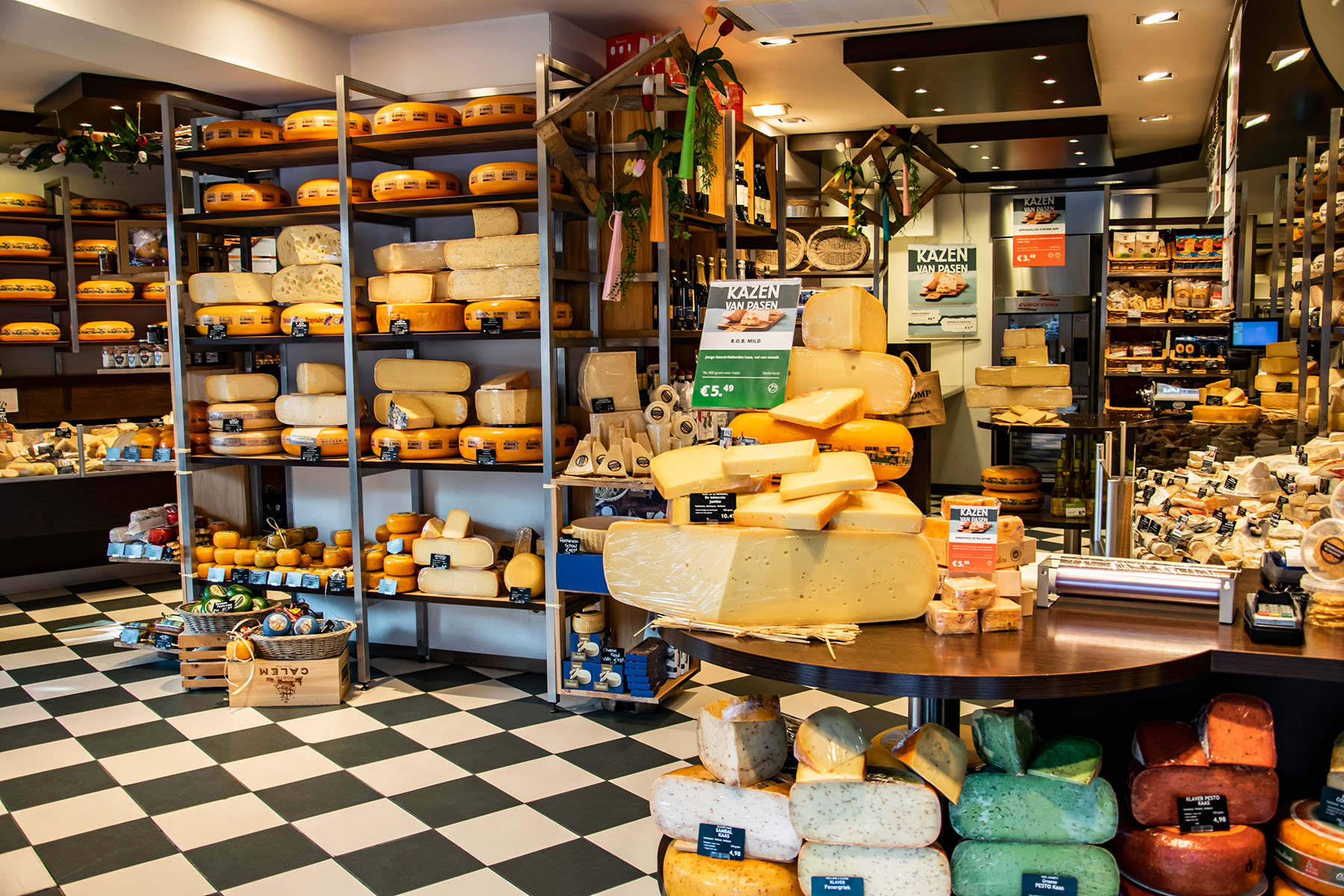
The Dutch pride themselves on their cheese, which is why you’ll come across plenty of cheese shops in the Netherlands. Some, particularly in city centers, predominantly cater to tourists although their cheese is often still good quality. However, the best cheese shops tend to be those away from the tourist trade, so look around for the best selection.
Convenience stores in the Netherlands
Sometimes you just need to quickly grab something to eat or drink. In the Netherlands, you’ll be able to do this at one of the country’s many convenience stores. Most are independently run, however, there are few chains you’ll start to notice when you live in the country:
- Albert Heijn To-Go (often found in train stations)
- Spar
Liquor stores in the Netherlands
Dutch law states that supermarkets are unable to sell alcohol with a higher alcohol content than 15%. This means they only sell beer, cider, wine, and fortified wine. However, you can still enjoy those gin and tonics at home by heading to the local liquor store.
Most neighborhoods will have a liquor store, whether a nationwide chain like Gall & Gall or an independent bottle shop. There are also a growing number of online stockists of beers, wines, and spirits, including:
Some supermarkets have liquor stores inside the shop, so search online to find your nearest as it may be closer than you think.
Buying groceries from your home country
Many expats will miss food from home. It’s a common problem for immigrants living abroad, but don’t worry because there are shops in the Netherlands catering for exactly this. In most large Dutch cities, you’ll find international food stores selling food products from the United States, the United Kingdom, and elsewhere. You’ll even be able to find some food you love in larger supermarkets.
Alternatively, there are online grocery delivery services that specifically cater to expats. Here, you’ll be able to find food from home that can be delivered to your new home. Be aware, though, that the price of these groceries is often more than you’re used to. Don’t forget, too, that one of the most important parts of expat life is adapting to the local cuisine. So, grab your shopping cart and let your tastebuds explore your new home.
